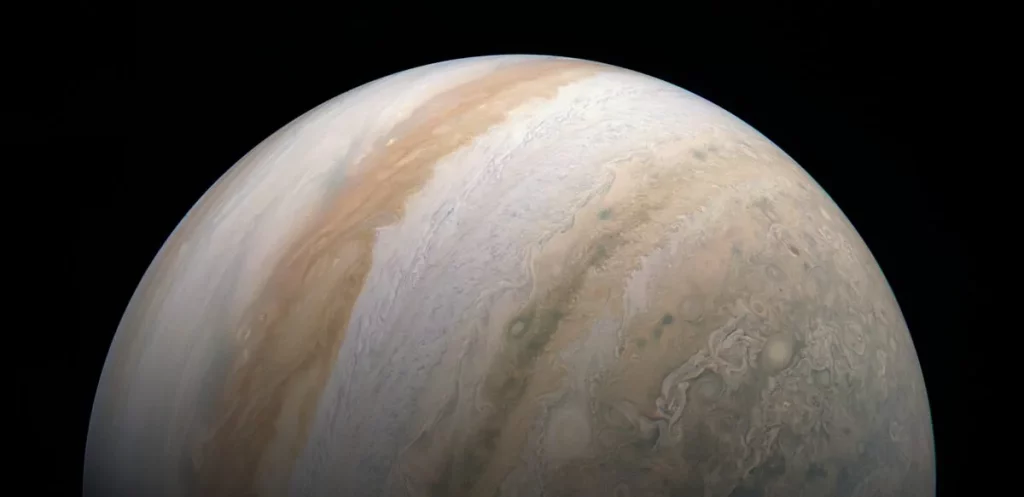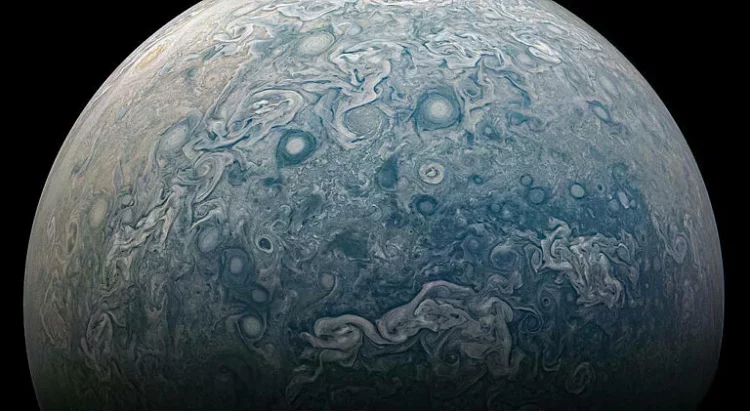1. Introduction
Jupiter, the largest planet in our Solar System, is renowned for many of its remarkable features, including its immense size, its iconic Great Red Spot, and its extensive system of moons. However, one of Jupiter’s most striking characteristics is its extraordinarily rapid rotation. This giant planet completes a full rotation in just under 10 hours, making it the fastest-spinning planet in our Solar System. This rapid rotation has profound implications for its atmospheric dynamics, magnetic field, and overall behavior. This article delves into the reasons behind Jupiter’s swift spin, explores its consequences, and considers the broader implications for planetary science.
2. Understanding Jupiter’s Rotation
2.1 The Basics of Planetary Rotation
Planetary rotation refers to the spinning of a planet around its axis. The rotation period, or sidereal day, is the time it takes for a planet to complete one full turn. For Jupiter, this rotation period is approximately 9.9 hours, a significant contrast to Earth’s 24-hour day. The speed at which a planet spins is influenced by several factors, including its initial formation conditions, internal structure, and angular momentum.
2.2 Jupiter’s Rotation Speed
Jupiter’s rotation is remarkable not just for its speed, but also for the effects it has on the planet’s shape and atmospheric phenomena. The planet’s equatorial region bulges outward due to its rapid spin, creating an oblate spheroid shape. This means that Jupiter’s equatorial diameter is larger than its polar diameter, a result of the centrifugal force generated by its rapid rotation.
3. The Formation of Jupiter
3.1 The Accretion of Gas Giants
Jupiter’s rapid rotation can be traced back to the early stages of the Solar System’s formation. Around 4.6 billion years ago, a protoplanetary disk of gas and dust surrounded the young Sun. In this disk, material began to coalesce under gravity, forming planetesimals that eventually merged to create planets. Jupiter, being the largest planet, formed from the accumulation of a vast amount of gas and dust, leading to its current size and mass.
3.2 Conservation of Angular Momentum
One of the key factors in Jupiter’s rapid rotation is the principle of conservation of angular momentum. Angular momentum is a measure of the rotational motion of an object and is conserved in a closed system. As Jupiter formed, it accumulated a large amount of gas and dust, causing it to spin faster as the material was concentrated in a smaller volume. This conservation of angular momentum led to the rapid rotation that we observe today.
3.3 Formation Dynamics
During the formation of Jupiter, the planet’s rapid rotation was likely influenced by the accretion of material from the surrounding protoplanetary disk. As gas and dust fell onto Jupiter, the planet’s rotation speed increased, similar to how a figure skater spins faster by pulling their arms in. This process, combined with Jupiter’s massive size and gravitational pull, contributed to its fast spin.
4. The Effects of Rapid Rotation
4.1 Oblate Shape
One of the most visible effects of Jupiter’s rapid rotation is its oblate shape. The planet’s equatorial diameter is about 7% larger than its polar diameter. This bulging at the equator is a direct result of the centrifugal force created by the planet’s fast spin, which counteracts the force of gravity and causes the equator to expand outward.
4.2 Atmospheric Dynamics
Jupiter’s rapid rotation has a significant impact on its atmospheric dynamics:
- Zonal Winds: The planet’s rotation leads to the development of strong zonal winds, which are large-scale, east-west atmospheric currents. These winds are responsible for the formation of Jupiter’s distinctive banded appearance, with alternating dark and light zones known as belts and zones.
- Great Red Spot: The Great Red Spot, a massive storm system located in Jupiter’s southern hemisphere, is influenced by the planet’s rapid rotation. The fast spin contributes to the storm’s persistence and intensity, creating a complex system of high-pressure and low-pressure regions.
4.3 Magnetic Field
Jupiter’s rapid rotation also plays a crucial role in generating its powerful magnetic field:
- Dynamo Effect: The planet’s magnetic field is generated by the dynamo effect, a process where the motion of electrically conducting fluids generates a magnetic field. Jupiter’s fast rotation enhances this effect by stirring up the planet’s metallic hydrogen interior, contributing to the creation of its strong magnetic field.
- Magnetosphere: Jupiter’s magnetic field extends far into space, forming a massive magnetosphere that influences the planet’s space environment. The magnetosphere interacts with the solar wind and traps charged particles, leading to intense radiation belts and auroras.
5. Comparison with Other Planets
5.1 Jupiter vs. Earth
Compared to Jupiter, Earth’s rotation is relatively slow. Earth completes one rotation in 24 hours, while Jupiter spins nearly three times faster. This difference in rotation speed leads to distinct variations in atmospheric dynamics, planetary shape, and magnetic field generation.
5.2 Jupiter vs. Saturn
Saturn, another gas giant, also has a rapid rotation, though not as fast as Jupiter’s. Saturn’s rotation period is approximately 10.7 hours. Like Jupiter, Saturn exhibits an oblate shape and strong zonal winds, but its atmospheric features differ due to its slower rotation and different composition.
5.3 Effects on Planetary Systems
The rotation speed of a planet affects its overall dynamics, including its climate, weather patterns, and magnetic field. Understanding the differences in rotation speeds among planets helps scientists learn about the processes that shape planetary systems and the factors influencing their behavior.
6. Observational and Theoretical Studies
6.1 Space Missions and Observations
Several space missions and telescopic observations have provided valuable data on Jupiter’s rotation and its effects:
- Juno Mission: NASA’s Juno spacecraft, which has been orbiting Jupiter since 2016, has provided detailed data on the planet’s atmospheric dynamics, magnetic field, and interior structure. Juno’s observations have contributed to our understanding of Jupiter’s rapid rotation and its impact on the planet’s features.
- Hubble Space Telescope: The Hubble Space Telescope has captured high-resolution images of Jupiter’s atmosphere and storms, revealing the intricate details of its banded structure and the Great Red Spot.
6.2 Theoretical Models
Theoretical models play a crucial role in understanding Jupiter’s rotation and its effects. Scientists use computer simulations and mathematical models to study the dynamics of Jupiter’s atmosphere, magnetic field, and internal structure. These models help researchers predict the behavior of the planet and compare it with observational data.

7. Implications for Planetary Science
7.1 Understanding Planetary Formation
Jupiter’s rapid rotation provides insights into the processes involved in planetary formation and the conservation of angular momentum. Studying Jupiter helps scientists learn about the early conditions of the Solar System and the factors influencing the formation of gas giants.
7.2 Insights into Atmospheric Dynamics
The study of Jupiter’s atmospheric dynamics enhances our understanding of the behavior of giant planets and their weather patterns. Comparing Jupiter with other planets, both in our Solar System and beyond, helps scientists develop models of atmospheric circulation and storm formation.
7.3 Comparative Planetology
Jupiter’s rotation and its effects are crucial for comparative planetology, the study of planets in comparison to one another. By examining how different planets rotate and how their rotation affects their features, scientists can gain insights into the diversity of planetary systems and the processes that shape them.
8. Future Research and Exploration
8.1 Upcoming Missions
Future missions to Jupiter and its moons will continue to provide valuable data on the planet’s rotation and its effects:
- Europa Clipper Mission: NASA’s Europa Clipper mission, scheduled for launch in the 2020s, will explore Jupiter’s moon Europa and study its potential subsurface ocean. The mission will also provide additional data on Jupiter’s magnetosphere and atmospheric dynamics.
- JUICE Mission: The European Space Agency’s Jupiter Icy Moons Explorer (JUICE) mission will study Jupiter’s atmosphere, magnetic field, and its moons, including Ganymede, Callisto, and Europa. JUICE will provide insights into Jupiter’s rotation and its effects on the planet’s system.
8.2 Advancements in Technology
Advancements in technology, including more sophisticated telescopes, spacecraft, and analytical tools, will enhance our ability to study Jupiter and its rapid rotation. These technological developments will enable more detailed observations and simulations, leading to a deeper understanding of the planet’s behavior.
9. Conclusion
Jupiter’s rapid rotation is one of the defining features of the Solar System’s largest planet. The planet’s swift spin results from its formation process and the conservation of angular momentum, leading to an oblate shape, dynamic atmospheric features, and a powerful magnetic field. Understanding Jupiter’s rotation provides valuable insights into planetary formation, atmospheric dynamics, and comparative planetology. As future missions and research continue to explore Jupiter and its system, we can expect to learn even more about the forces shaping this extraordinary planet and the broader processes influencing planetary systems across the universe.
The study of Jupiter’s rapid rotation not only enhances our knowledge of the giant planet but also contributes to our understanding of the fundamental principles governing planetary behavior. As we advance our exploration and research, we gain a deeper appreciation for the complexity and diversity of the universe, inspiring continued discovery and exploration.











































Discussion about this post